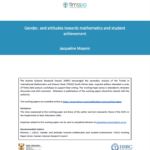Gender, and attitudes towards mathematics and student achievement

That girls continue to be underrepresented in science, technology, engineering, and mathematics (STEM), is of concern both for the future of work and for the reduction of labour market inequalities. This study employs distributional analysis to investigate the relationship between attitudes towards mathematics and achievement for grade 9 girls and boys and the gender gap in mathematics using the TIMSS 2019 South Africa dataset. Results show that girls outperform boys at the mean, but once individual and background characteristics are controlled for, the gender gap in mathematics achievement actually favours boys. This suggests that mean characteristics differ between grade 9 boys and girls and that the gender gap favouring girls reflects, for example, the fact that there is a far larger share of boys in the overage category, resulting in a mismatch in average contrasts. Also, the gender gap across the distribution differs by school quintiles with girls from no fee schools (quintiles 1 to 3) doing better than boys across the achievement distribution, while boys from fee paying schools (quintiles 4 and 5) outperform girls at the top of the performance distribution. While we find a significantly positive relationship between being confident in mathematics and performance, only a small share of boys and girls, especially those from disadvantaged schools, are confident in mathematics with girls reporting having disproportionately lower self confidence in comparison to boys. The policy implications are two-fold, that is, urgent attention needs to be directed towards curtailing the repeat rates among relatively underperforming older boys, and policy campaigns aimed at reducing the gender gap adverse to girls must be aggressively continued. This means that there is still need for role models and programmes that normalize excelling in mathematics for both boys and girls.
